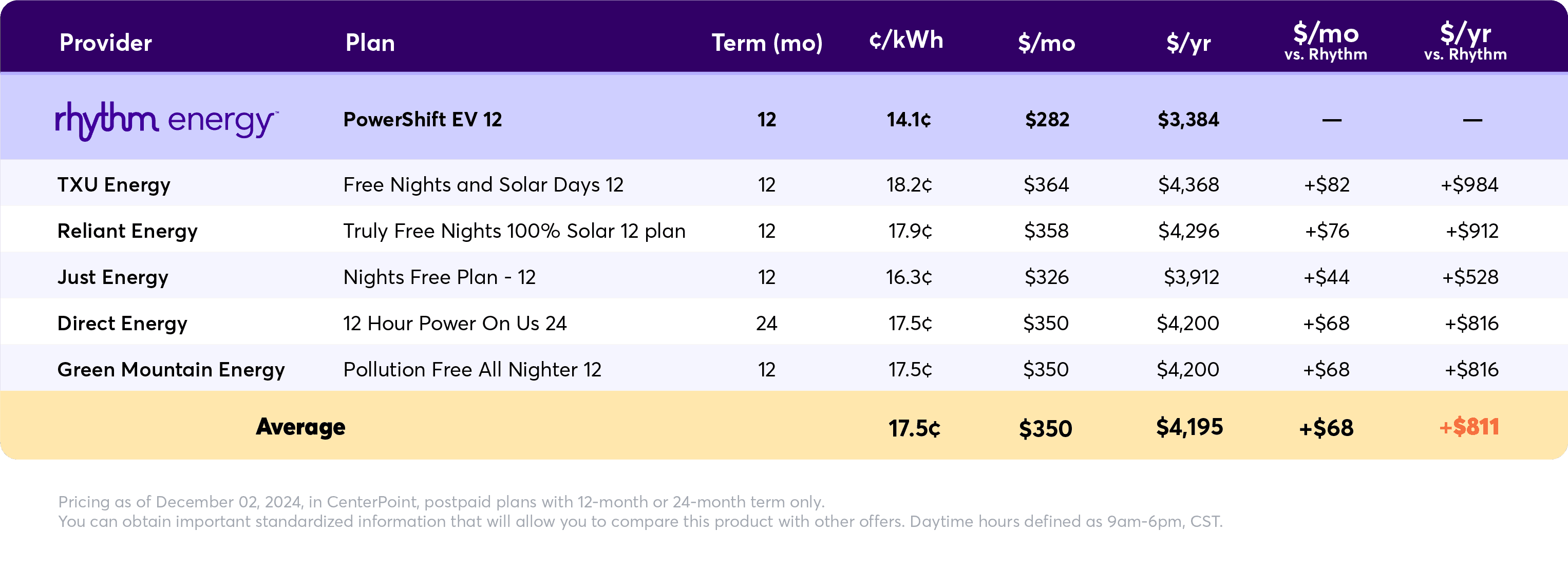Get on the road to savings.
Our PowerShift EV plan puts you on the road to savings. Simply charge your EV overnight for super cheap, every night. And save every day.
With our PowerShift EV plan, your next stop is a smaller electricity bill.
Charge your electric vehicle for super cheap.
Looking to maximize incentives, discounts, and savings on your electricity bill? The plan bring electricity rates tailored for EV owners, built for seamless integration with your home energy usage.
Our PowerShift EV time-of-use plans entice you to shift when you charge your EV to overnight hours for next to nothing and save.
You've already made the smart choice by going green with an EV, so why not reward yourself by saving money while you charge it?
PowerShift EV 12
Charge your EV overnight and save.
- EV required
- Time-dependent fixed rates
- Up to 20 hours of super cheap rates
Rates starting at
You could save $1,000 or more a year.
No, really.

PowerShift time-of-use plan FAQs
PowerShift EV 12: On-peak: 6pm-10pm, Ultra off-peak: Midnight-6am, Off-peak: All other hours
PowerShift EV Seasonal 12: On-peak: 6pm-10pm, Seasonal on-peak: 6am-9am (January, February, March only), Ultra off-peak: 12am-6am, Off-peak: All other hours
Nope, only that you deliberately shift the charging of your electric vehicle to the times when the rate paid for electricity is cheaper.
At their core, time-of-use plans are fueled by time, and more specifically, the ability to manage and predict energy usage during specific moments in time. At specific times of the day, a lot of people use a lot of energy, which can put pressure on the grid. These moments of pressure are called on-peak hours. And you can probably guess when those might be. During the summer, on-peak hours are the evening hours when the weather is hot, and you need your house cool. Off-peak is when you don’t need to use as much electricity.
TOU plans charge different rates at different times of day to incentivize a natural shift to ease the grid and help the planet. And with a few simple changes of behavior, you can see a substantially lower electricity bill each month. By simply limiting your electricity consumption during on-peak hours of the day, you can save money and help the grid. This could mean cranking your AC to cool your house overnight so you don’t have to have it as low during the on-peak hours. Or running your pool pump or charging your EV overnight.
Absolutely. There is no need to invest in new hardware for charging your electric vehicle.
At their core, time-of-use plans are fueled by time, and more specifically, the ability to manage and predict energy usage during specific moments in time. Plans like these charge different rates at different times of day to incentivize a natural shift to ease the grid and help the planet. And with a few simple changes of behavior, you can see a substantially lower electricity bill each month.
At specific times of the day, a lot of people use a lot of energy, which can put pressure on the grid. These moments of pressure are called on-peak hours. And you can probably guess when those might be. During the summer, on-peak hours are the evening hours when the weather is hot, and you need your house cool. Off-peak is when you don’t need to use as much electricity.
These plans are meant to help customers like you save, while also helping the planet and the grid—which we all in Texas know is oh-so important. By simply limiting your electricity consumption during on-peak hours of the day, you can save money and help the grid. This could mean cranking your AC to cool your house overnight so you don’t have to have it as low during the on-peak hours. Or running your pool pump or charging your EV overnight.
And, no, these plans don’t come with a lot of gotchas. They are exactly what they are. A way for everyone to help each other while also helping themselves, their wallet, and the grid.
They're time-of-use (TOU) plans. TOU is a billing concept in which the price of electricity varies based on when it’s used. While historically, this has been focused on differentiating price based on time of day, it can also be varied based on day or week, month of the year, or other potential markers. But what makes our plans unique is that they are just that: unique. We don’t take a one-size-fits-all approach like some others do. We developed multiple customized plans, and depending on your needs, usage, tech-savviness, and willingness to make some simple changes, you can save a lot of money.
If you can shift your energy consumption off of on-peak hours, your bill will go down. It’s as simple as that. And depending on which plan you choose, those hours will occur at different times with different energy rates incentives in each time slot.
Anyone who is willing to make a few slight adjustments in their day-to-day energy usage can save a lot of money. With technology where it’s at today, for example if you own a smart thermostat or an EV charging app, it’s simple to just set up energy adjustments on your phone (turning your AC up a few degrees during evening on-peak hours then back down afterwards). Also, the grid and the planet benefit. You're contributing to a cleaner future, because you’re using more power during periods of the day that are usually supplied by a higher percentage of renewable energy sources like wind and solar.
Energy charge breakdowns by hour specific to your plan can be found in the Learn More section of plan card or on EFL.